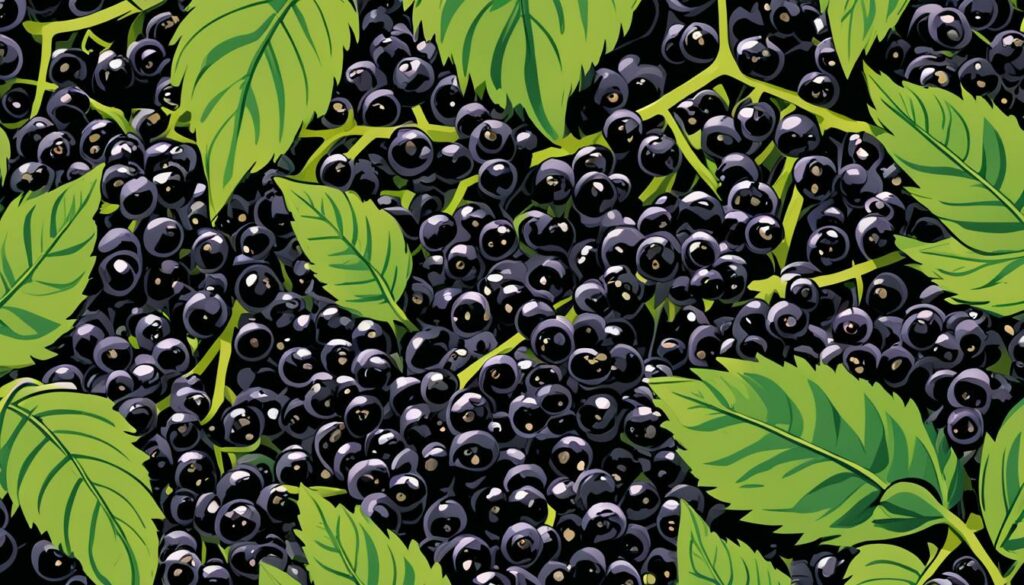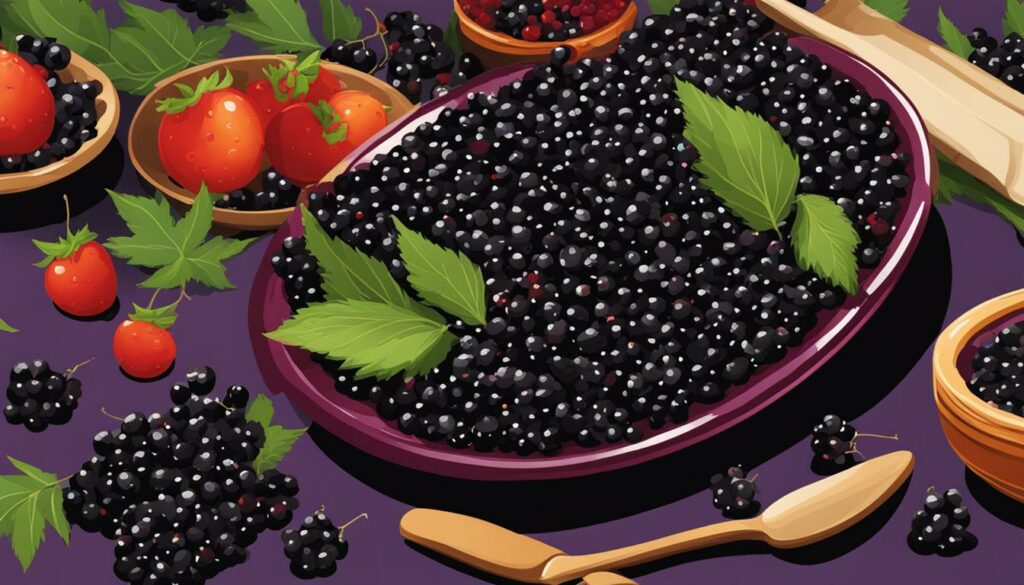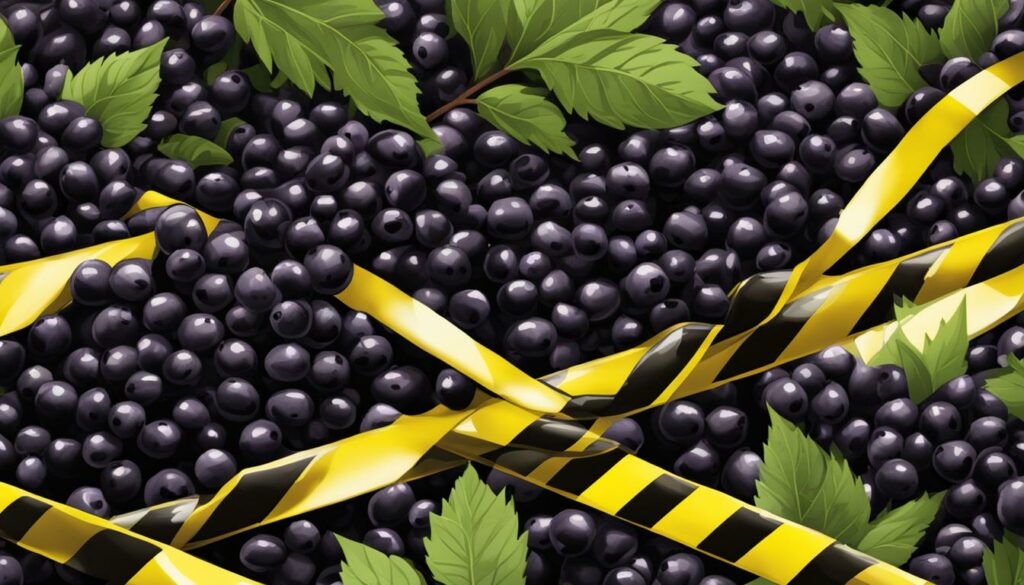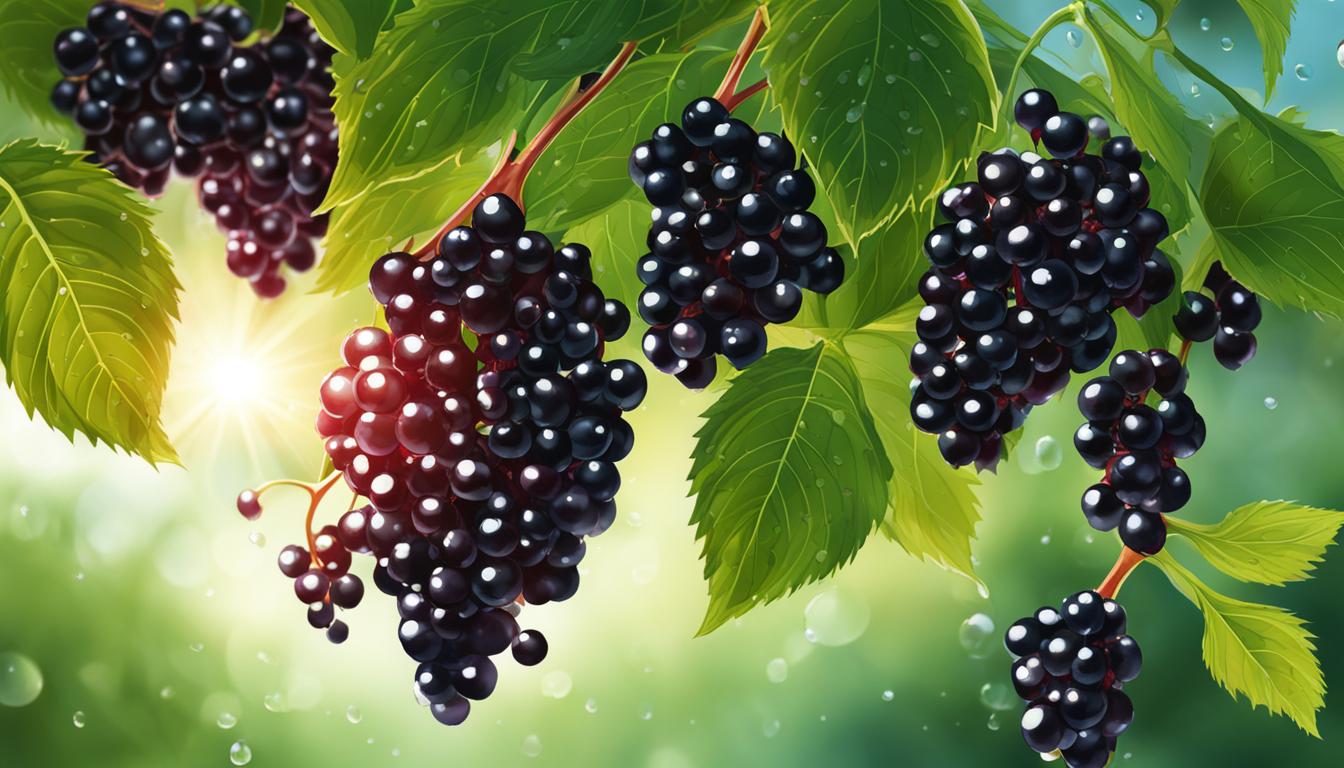Welcome to our article on the uses and benefits of Black Elderberry! If you’re looking for a natural remedy to support your immune system, alleviate cold and flu symptoms, or improve your overall health, you’ve come to the right place. In this article, we will explore the various uses of Black Elderberry, including its supplement and syrup forms, and highlight its potential health benefits.
Black Elderberry, scientifically known as Sambucus nigra, is rich in antioxidants and has been traditionally used for its medicinal properties. Research suggests that elderberry may help reduce the severity and duration of cold and flu symptoms, making it a popular natural remedy. Elderberry products, such as supplements, syrups, and extracts, are widely available and can be easily incorporated into your daily routine.
Elderberries are packed with antioxidants, especially anthocyanins, which give them their dark color. These antioxidants have been linked to a range of health benefits, including protection against chronic diseases and reducing oxidative stress. Elderberries also possess anti-inflammatory properties due to the presence of flavonoids, making them beneficial for skin health and potentially neuroprotective.
In addition to its potential immune support and anti-inflammatory properties, elderberries may also contribute to heart health and metabolic improvements. Animal studies have shown promising results, including regulation of cholesterol levels, blood pressure management, and metabolic benefits.
It is important to note that while elderberries offer numerous health benefits, precautions should be taken. Raw elderberries and certain parts of the plant can contain harmful compounds and should not be consumed. Cooking elderberries before consumption helps eliminate these toxins. Elderberry supplements and products may also interact with certain medications or supplements, so consulting with a healthcare professional is advised.
In conclusion, Black Elderberry is a versatile natural remedy with a long history of use and potential health benefits. Whether you’re looking for immune support, relief from cold and flu symptoms, or a boost to your overall health, incorporating Black Elderberry into your routine may be worth considering. Remember to consult with a healthcare professional before starting any new supplement or herbal remedy.
Boosting the Immune System with Black Elderberry
When it comes to supporting immune health, Black Elderberry proves to be a powerful natural remedy. Numerous studies have demonstrated its effectiveness in combating colds and flu, leaving you with less downtime and more time to enjoy life. For immune support, Black Elderberry is a game-changer.
One study conducted on 60 patients with flu-like symptoms found that those who took elderberry syrup experienced improvement in just four days, compared to the placebo group. Another study involving 32 individuals showed that elderberry extract helped ease flu-like symptoms within a day, showcasing its rapid efficiency.
Elderberries are not only effective in alleviating cold and flu symptoms but are also believed to strengthen our immune system. The antiviral properties present in elderberries can inhibit the replication of certain viruses, contributing to a faster recovery. Children can also benefit from elderberry as it may help reduce the severity and duration of cold and flu symptoms.
Additionally, elderberry may have a dual role in addressing allergy symptoms and reducing inflammation. While further research is needed, preliminary studies indicate that elderberry’s immune-boosting properties extend beyond cold and flu relief, making it a promising ally for overall immune health.

Black Elderberry Benefits for the Immune System:
- Reduces the severity and duration of cold and flu symptoms
- Improves recovery time
- Strengthens the immune system
- Inhibits virus replication
- May alleviate allergy symptoms
- Reduces inflammation
With its remarkable ability to support the immune system, Black Elderberry is a natural choice for those looking to stay healthy and resilient. Incorporating elderberry into your daily routine may provide the boost your immune system needs to ward off illnesses and maintain optimal well-being.
Antioxidant and Anti-inflammatory Properties of Black Elderberry
Elderberries are packed with antioxidants, particularly anthocyanins, which give them their dark color. These antioxidants have been linked to numerous health benefits, including protecting against chronic diseases and reducing oxidative stress.
Elderberries also have anti-inflammatory properties due to the presence of flavonoids. This makes them beneficial for skin health, reducing age spots, wrinkles, and inflammation.
Studies suggest that elderberry’s antioxidants and anti-inflammatory properties may also have neuroprotective benefits, protecting the brain from damage and potentially improving cognition.
To get a better understanding, here’s a table summarizing the antioxidants and anti-inflammatory compounds found in black elderberry:
| Antioxidants in Black Elderberry | Anti-inflammatory Compounds in Black Elderberry |
|---|---|
| Anthocyanins | Flavonoids |
You can see that black elderberry is a rich source of both antioxidants and anti-inflammatory compounds, making it a valuable addition to your health routine.

Heart Health and Metabolic Benefits of Black Elderberry
Research suggests that black elderberry may offer potential heart health and metabolic benefits. While most studies have been conducted on animals, the findings are promising and warrant further research on humans. Incorporating black elderberry into your diet may have a positive impact on cholesterol levels, blood pressure, and blood sugar control.
Animal studies have shown that elderberries can regulate cholesterol levels, potentially reducing the risk of cardiovascular disease. The antioxidants present in elderberries may help prevent the oxidation of LDL cholesterol, commonly known as “bad” cholesterol. This can contribute to better heart health and reduce the risk of plaque buildup in the arteries.
Additionally, elderberries have been found to have a positive effect on blood pressure levels. Animal studies indicate that elderberry extract can help manage blood pressure by relaxing the blood vessels, promoting better blood flow, and reducing hypertension. It is worth noting that more research is needed to confirm these findings in humans.
Metabolism plays a crucial role in maintaining overall health and well-being. Preliminary studies suggest that elderberries may support metabolic health by reducing triglyceride levels and managing insulin levels. These effects can potentially contribute to a healthy weight management and reduce the risk of metabolic disorders such as diabetes.
To fully understand the extent of the heart health and metabolic benefits of black elderberry, more human-based studies are required. However, incorporating black elderberry into a balanced diet, alongside a healthy lifestyle, can potentially support overall cardiovascular and metabolic well-being.

Black Elderberry for Cold and Flu Symptoms
Elderberries have long been used as a natural remedy for cold and flu symptoms. It’s no wonder why – research suggests that elderberry may help reduce the severity and duration of common cold and flu symptoms such as fever, cough, and congestion. But what exactly makes black elderberry such an effective solution?
Studies have shown that elderberry may possess antiviral properties that can inhibit the replication of specific viruses. This means that it could possibly help your body fight off the viral infection responsible for your cold or flu. In addition to its antiviral effects, elderberry is packed with antioxidants that can support your immune system and promote overall wellness.
When it comes to using elderberry as a natural remedy, there are various products available on the market, including syrups and extracts. These products are typically created from the berries of the black elderberry plant, which are rich in beneficial compounds.
However, it’s important to note that while elderberry has shown promising results in reducing cold and flu symptoms, it should not replace medical treatment. If you’re experiencing severe or prolonged symptoms, it’s always best to consult with a healthcare professional.
“Elderberry has been used for centuries to ease symptoms of cold and flu. Its antiviral properties and immune-boosting effects make it a popular natural remedy.”
If you’re considering incorporating black elderberry into your cold and flu regimen, here are a few key points to keep in mind:
- Choose reputable brands that offer high-quality elderberry products.
- Follow the recommended dosage instructions provided by the manufacturer.
- Be aware of any potential allergies or interactions with other medications or supplements.
Remember, maintaining good hygiene practices, such as regular handwashing, getting plenty of rest, and staying hydrated, are also essential for supporting your immune system and recovering from illness.
Dosage Recommendations for Black Elderberry
The optimal dosage of black elderberry for cold and flu symptoms may vary depending on the product and individual need. It’s always best to follow the dosage instructions provided by the manufacturer. However, as a general guideline:
| Product | Dosage | Frequency |
|---|---|---|
| Elderberry Syrup | 1-2 teaspoons | 2-3 times a day |
| Elderberry Extract | 1-2 dropperfuls | 2-3 times a day |
It’s important to note that these are general recommendations, and it’s best to consult with a healthcare professional for personalized advice.

In conclusion, black elderberry has a long history of being used as a natural remedy for cold and flu symptoms. Research suggests that it may help reduce the severity and duration of these symptoms, thanks to its antiviral and immune-boosting properties. While elderberry can be a beneficial addition to your cold and flu regimen, it should not replace medical treatment. Consult with a healthcare professional for personalized advice and dosage recommendations.
Culinary Uses of Black Elderberry
In addition to its medicinal benefits, black elderberry is a versatile ingredient that can be used in a variety of culinary creations. By incorporating black elderberry into your recipes, you can enjoy its unique flavor while reaping the potential health benefits.
The flowers and berries of the elderberry tree are the main components used in culinary applications. They can be transformed into delightful syrups, jams, pies, wines, cordials, and juices.
One popular way to enjoy the rich flavor of elderberries is through homemade elderberry syrup. This sweet and tangy syrup can be drizzled over pancakes, waffles, or ice cream for a delectable treat. It can also be mixed into cocktails or used as a topping for yogurt or oatmeal.
Black elderberry jam is another delicious option for incorporating elderberries into your meals. Spread it on freshly baked bread or use it as a filling for pastries to add a burst of fruity flavor. You can even blend the jam into smoothies for a nutritious and refreshing beverage.
If you prefer a lighter option, elderberry juice is a popular choice. Made from the fresh berries, it can be enjoyed on its own or used as a base for mixed drinks. Elderberry juice pairs well with sparkling water or lemonade, creating a refreshing beverage for any occasion.
Here is a simple recipe to make your own homemade elderberry syrup:
- In a saucepan, combine 2 cups of fresh elderberries, 1 cup of water, and 1 cup of sugar.
- Bring the mixture to a boil, then reduce the heat and let it simmer for about 30 minutes.
- Remove the saucepan from the heat and let the mixture cool.
- Using a fine-mesh strainer or cheesecloth, strain the syrup to remove any solid particles.
- Pour the syrup into a clean jar or bottle and refrigerate.
You can adjust the sweetness of the syrup by adding more or less sugar according to your taste. Store the homemade elderberry syrup in the refrigerator for up to several weeks and enjoy it in various culinary creations.
| Black Elderberry Culinary Uses | Recipes |
|---|---|
| Elderberry Syrup | Homemade Elderberry Syrup |
| Elderberry Jam | Elderberry Jam-filled Pastries |
| Elderberry Juice | Sparkling Elderberry Lemonade |
By incorporating black elderberry into your culinary creations, you can not only enjoy its delicious taste but also potentially benefit from its natural health properties. Get creative in the kitchen and explore the culinary uses of black elderberry to elevate your meals and enhance your well-being.

Precautions and Safety Considerations for Black Elderberry
While black elderberries offer numerous health benefits, it is essential to take precautions and consider safety measures when using them. Here are some important points to keep in mind:
- Raw elderberries and certain parts of the plant, such as leaves, bark, stems, and unripe berries, contain harmful compounds and should not be consumed. Cooking elderberries before consumption helps eliminate these toxins.
- Allergic reactions to elderberries can occur, so it is important to be aware of any potential allergies. If you experience any adverse reactions, such as itching, rash, or difficulty breathing, seek immediate medical help.
“It’s crucial to cook elderberries before eating to eliminate toxins.” – Dr. Sarah Johnson, MD
- Elderberry supplements and products may interact with certain medications or supplements. Particularly, those that suppress immune responses or are diuretics. Consult with a healthcare professional before incorporating elderberry supplements or products into your routine if you are taking any medications or other supplements.
By following these precautions and consulting with a healthcare professional, you can safely enjoy the potential health benefits of black elderberries.
The Black Elderberry Safety Checklist
Use the following checklist to ensure your safety while consuming black elderberry:
| Precautions | Safety Tips |
|---|---|
| 1 | Do not consume raw elderberries or any other parts of the plant that are known to be toxic. |
| 2 | Cook elderberries before consumption to eliminate toxins. |
| 3 | Be aware of any potential allergies and seek immediate medical help if you experience any adverse reactions. |
| 4 | Consult with a healthcare professional before taking elderberry supplements or products, especially if you are on any medications or other supplements. |

Following these safety measures will help you enjoy the potential health benefits of black elderberry without any unnecessary risks.
Cultivation and Varieties of Black Elderberry
Black elderberries are native to Europe and North America, with different subspecies and varieties found in various regions. In the United States, the American black elderberry (Sambucus nigra subsp. canadensis) is commonly cultivated for its culinary and medicinal uses. The Pacific Northwest of the United States also has the Blue Elderberry (Sambucus cerulea), which is a larger variety but should be consumed in moderation due to its higher concentration of cyanide compounds.
Cultivating black elderberries is feasible by pruning and managing root sprouts, and there are various cultivars available to enhance the quality of berries and flowers.

Varieties of Black Elderberry
| Variety | Scientific Name | Region | Characteristics |
|---|---|---|---|
| American Black Elderberry | Sambucus nigra subsp. canadensis | North America | Commonly cultivated for culinary and medicinal uses. |
| Blue Elderberry | Sambucus cerulea | Pacific Northwest of the United States | Larger variety with higher cyanide compound concentration. Should be consumed in moderation. |
| Mexican Elderberry | Sambucus mexicana | Mexico | Native to Mexico, used in traditional medicine. |
The variety of black elderberry you choose to cultivate will depend on your specific region and intended use.
Historical Significance and Folklore of Black Elderberry
Black elderberry holds a special place in both Native American and European herbal traditions, with a rich history and fascinating folklore surrounding its use. For centuries, black elderberry has been valued for its medicinal properties, offering a natural approach to various health concerns. Historical records indicate that black elderberry was used to maintain healthy blood sugar levels, promote perspiration during fever, and support healthy bowel movements.
The folklore surrounding black elderberry is steeped in stories of protection from supernatural beings and the belief in its powerful properties. In many cultures, the name “elder” itself carries a sense of reverence and respect, reflecting the deep cultural significance attributed to this remarkable plant.
“The lore surrounding black elderberry speaks of its ability to ward off evil spirits and protect those who seek its guidance. The plant has long been considered a guardian of health and well-being, with its berries and flowers believed to possess magical properties.”
Throughout history, people have cherished black elderberry for its potential to promote overall wellness. From ancient civilizations to modern times, this humble plant has been revered and continues to be sought after for its myriad of health benefits.
Medicinal Uses of Black Elderberry in Tradition and Folklore
In Native American herbal traditions, black elderberry was highly regarded for its medicinal properties. It was used to support respiratory health, ease coughs and congestion, and provide relief from cold and flu symptoms. The berries and flowers were often prepared as infusions or syrups to help boost the immune system and aid in the body’s natural healing process.
In European folklore, black elderberry was known as the “medicine chest of the common people.” It was believed to have the power to ward off illness and protect against evil spirits. The plant was often associated with healing and was used for various ailments, including digestive issues, skin conditions, and headaches.
The Cultural Significance of Black Elderberry
Black elderberry’s historical uses and folklore provide valuable insights into its cultural significance. The plant’s presence in traditional herbal practices highlights the trust and reliance placed upon it as a natural remedy. It represents a connection to nature and the wisdom passed down through generations.
While the historical uses and folklore offer glimpses into the potential benefits of black elderberry, it is important to note that scientific research is still ongoing. Further studies are needed to fully understand and validate the medicinal properties of black elderberry and its potential applications in modern healthcare.

“Black elderberry has a rich and storied past, intertwined with the cultural fabric of diverse societies. It continues to captivate our attention and inspire further exploration into its potential therapeutic uses.”
Conclusion
Black elderberry is a versatile fruit that offers a wide range of potential health benefits. From immune support to relief from cold and flu symptoms, this natural remedy has been valued for its healing properties for centuries. The rich antioxidant and anti-inflammatory properties of black elderberry contribute to its potential health benefits, making it a valuable addition to your wellness routine.
However, it is important to approach black elderberry consumption with caution. While it has a long history of traditional use, further research is needed to fully understand and validate its efficacy for various health conditions. It is always advisable to consult with a healthcare professional before incorporating black elderberry supplements or products into your routine.
When enjoying black elderberry, consider its culinary uses as well. From syrups, jams, and pies to juices and smoothies, there are many delicious ways to include black elderberry in your diet. Just remember to take note of any precautions and safety measures, as raw elderberries and certain plant parts can be toxic.
In conclusion, black elderberry offers a promising natural remedy for various health needs. Its potential immune-boosting, anti-inflammatory, and heart health benefits make it worth exploring. However, always consult with a healthcare professional and exercise caution when incorporating black elderberry into your routine to ensure your safety and well-being.
FAQ
What are the uses of black elderberry?
Black elderberry can be used for immune support, reducing cold and flu symptoms, promoting heart health, managing metabolism, and as a natural remedy.
How does black elderberry boost the immune system?
Black elderberry is believed to have antiviral properties that can inhibit the replication of certain viruses, potentially reducing the severity and duration of cold and flu symptoms.
What are the antioxidant and anti-inflammatory properties of black elderberry?
Black elderberry is rich in antioxidants, particularly anthocyanins, which protect against chronic diseases and reduce oxidative stress. It also contains flavonoids that have anti-inflammatory properties.
How does black elderberry benefit heart health and metabolism?
Studies suggest that black elderberry may regulate cholesterol levels, manage blood pressure, control blood sugar levels, and promote metabolic health. However, further research is needed to confirm these findings.
Can black elderberry help with cold and flu symptoms?
Research suggests that black elderberry may help reduce the severity and duration of cold and flu symptoms, such as fever, cough, and congestion. However, it is not a replacement for medical treatment.
What are the culinary uses of black elderberry?
Black elderberry can be used to make syrups, jams, pies, wines, cordials, and juices. It can be spread on toast, used as toppings for yogurt or oatmeal, or blended into smoothies.
Are there any precautions and safety considerations for black elderberry?
Raw elderberries and certain parts of the plant can be toxic, so it is important to cook elderberries before consumption. Allergic reactions can occur, and elderberry supplements may interact with certain medications or supplements. Consult with a healthcare professional before use.
What are the different varieties of black elderberry?
The American black elderberry and the Blue Elderberry are common varieties in the United States. The Blue Elderberry should be consumed in moderation due to its higher concentration of cyanide compounds.
What is the historical significance and folklore of black elderberry?
Black elderberry has been used for centuries in Native American and European herbal traditions for various medicinal purposes. It has folklore surrounding supernatural protection and the importance of respecting the plant.
In summary, what are the benefits of black elderberry?
Black elderberry offers potential health benefits, including immune support, relief from cold and flu symptoms, antioxidant and anti-inflammatory properties, potential heart health and metabolic benefits. Further research is needed to fully understand its efficacy for various health conditions.
Source Links
- https://pharmeasy.in/blog/elderberry-benefits-a-deep-dive-into-its-research-backed-health-effects/
- https://www.naturemade.com/blogs/health-articles/elderberry-health-benefits
- https://herbalrootssupplements.com/blogs/herbal-benefits/black-elderberry-history-and-uses

